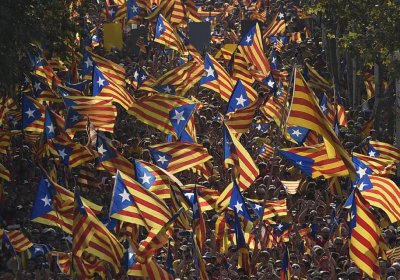An estimated 33,000 people marched through the Basque city of Donostia on January 17 to protest ongoing Spanish state repression against civil rights activists and lawyers in the Basque Country.
Marching under a large banner reading “Human Rights, Resolution, Peace”, the demonstration included members of the Basque pro-independence left coalition EH Bildu, trade unions and supporters of Basque political prisoners.
Spain
On November 9, 2.305 million residents of Catalonia defied a November 4 Spanish Constitutional Court ruling and voted on what future political status they wanted for their country, now one of the 17 “autonomous communities” (regions) within the Spanish state.
Because of their rebellion — festive but determined — it was not just another voting day. Initiative for Catalonia-Greens (ICV) co-coordinator Joan Herrera called it “the biggest demonstration in the history of this country”.
Millions of residents of Catalonia will indicate their preference for the future political status of their country, one of the 17 “autonomous communities” (regional governments) within the Spanish state, in the November 9 Catalan “participatory process”.
The “process” will present voters with the same ballot paper as the original non-binding consultation adopted by the Catalan parliament on September 26 — which was immediately suspended by the Spanish Constitutional Court.
Its asks: “(1) Do you want Catalonia to become a state? (2) If yes, do you want that state to be independent?”
For 48 hours, it looked as if Thursday, October 16, 2014 might join similar October Thursdays in 1907, 1929 and 1979 as another dramatic moment when sharemarket panic triggered economic downturn.
However, it was not to be. The US$3 trillion slump in world sharemarket values in the first two-and-half-weeks of October had, by October 24, been partially reversed by a coordinated effort of “calm engineering” by central bankers.
But how long can that treatment ― whose message to the gambling fund managers is that interest rates will stay low ― succeed?
About 8000 people packed the Palacio Vistalegre in Madrid on October 18 and 19, with 150,000 taking part online, for the the final stages of the Citizens' Assembly “Si se puede” (Yes we can).
The assembly discussed draft documents for the foundation of Podemos.
The normally torpid Spanish legal system had an attack of extreme speed on September 29.
Its highly abnormal Usain Bolt-like behaviour was caused by the Catalan regional government formally decreeing its long-awaited November 9 non-binding consultation of Catalan public opinion on the region's political status.
This year’s September 11 Catalan national day (Diada) demonstration, in support of the Catalan parliament’s planned November 9 popular consultation on Catalan statehood, was the biggest since the present cycle of mobilisations for Catalonia’s right to self-determination began four years ago.
Since the two-party political establishment in the Spanish state ― the People’s Party (PP) of prime minister Mariano Rajoy and the Spanish Socialist Workers Party (PSOE) ― got less than 50% in the May 25 European elections, its nightmares have been getting scarier.
The spectre disturbing their sleep is Podemos, the political expression of the indignado movement that in May 2011 exploded against austerity and corruption and for “real democracy”.
If anyone can get the different forces of the Catalan left to unite in support of a common cause, it is Ada Colau. The spokesperson of the anti-eviction Mortgage Victims Platform (PAH) until early May, Colau is almost certainly the most popular and respected social activist in the Spanish state.
On June 26, Colau launched Let’s Win Barcelona platform for next year's May municipal elections in the Catalan capital.
The five seats and 7.9% won by the new Podemos (“We Can”) ticket in the May 25 European election was an earthquake in Spanish politics.
Podemos was inspired by the indignado movement that exploded across the Spanish state in 2011 against austerity and for “real democracy”. The movement was driven by mass popular assemblies, which provided a striking counter-point to the frequently corrupt “politics as usual”.
An old truism says that in periods of crisis, politics speeds up.
That is being strikingly confirmed in the Spanish state after the June 2 abdication of King Juan Carlos. So too is its corollary ― that institutions that seemed solid and long-lasting suddenly look out-of-date and fragile.
As news spread of the abdication of the Spanish king Juan Carlos on June 2, a strange rustling sound could be heard across Barcelona. Hard to work out at first, it soon became clear what it was. It was the city — the capital of Catalonia — laughing.
In the city’s thousands of bars, people were hooting with glee at the wave of tweets that the king’s decision to abdicate in favour of his son, Felipe, was provoking. Probably the favourite in my local bar of young and old unemployed, read: “With Mariano Rajoy [Spanish prime minister] in charge, even the king gets to lose his job.”
- Previous page
- Page 13
- Next page











